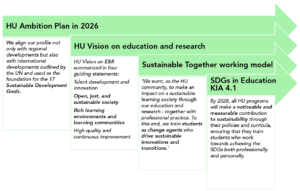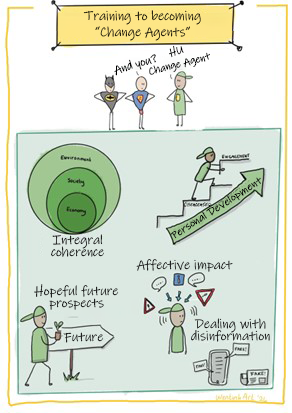Why SDGs in education?
Social developments[1] are a reason to work toward sustainable development goals, such as:
- Growing wealth inequality
- Climate Change
- Loss of biodiversity
- Growing polarisation in society
- War and refugee flows
- Epidemics/pandemics
Education is often explicitly looked at as the place where future citizens and professionals must learn the attitudes and skills necessary for a sustainable society. There are numerous initiatives within higher education to enable this sector to contribute to sustainable development in society. This includes the universities of applied sciences in the Netherlands.
[1] Source: Monitor Brede Welvaart en SDGs (CBS 2022)

The HU signed the SDG charter in 2019 and committed to the sustainable development goals.
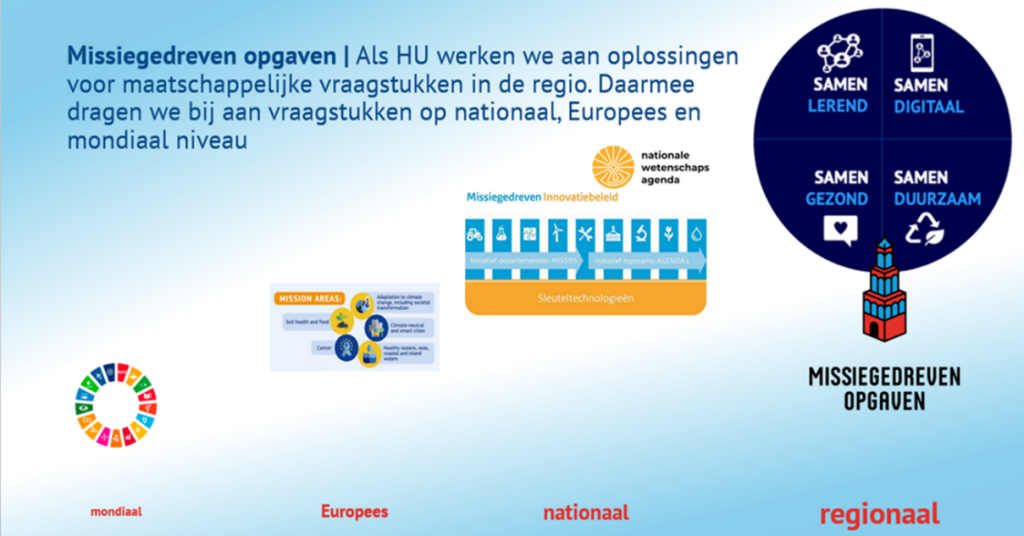
The HU’s mission-driven tasks are regionally focused but contribute to the global sustainable development goals.
HU University of Applied Sciences Utrecht implements these goals, among other things, through mission-driven tasks that have been formulated in collaboration with the region in the four Knowledge and Innovation Agendas (KIA). Within the KIA Sustainable Together (Samen Duurzaam), explicit reference is also made to the ambition that all education at the HU makes a noticeable and measurable contribution to sustainability.
The HU’s ambitions in the field of sustainable education at HU University of Applied Sciences Utrecht are laid down in various strategic documents:
- The HU Ambition Plan in 2026
- The HU Vision on education and research
- The Sustainable Together working model, in which the mission of Sustainable Together is summarised
- The project assignment SDGs in education and the broader assignment for a transition to sustainability education in the Knowledge and Innovation Agenda (KIA) of Sustainable Together
What is sustainable transition about?
A sustainable transition is a systemic change, a social upheaval, in which we adopt different values. We are moving from the current situation that is no longer sustainable to a positive contribution to the SDGs. In order to contribute to this at HU University of Applied Sciences Utrecht, we train our students as change agents and, as lecturers, we also fulfil that role ourselves.
If we look at the sustainable transition of education itself, the model below is helpful, based on the following three-way classification:
- Education about sustainable development
- Education for sustainable development
- Sustainable education
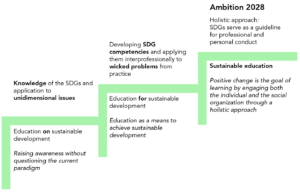
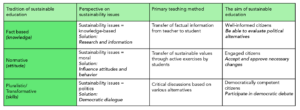
In order to make the transition to sustainable education, it must be about more than knowledge. It is important to do this from three different perspectives.
(refer to extended version of this model)
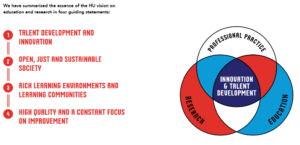
In accordance with the HU vision on education and research, we shape the transition to sustainable education within the triangle of education, research and professional practice. Because that is where the innovation happens.
Sustainable education also requires something from the didactic and pedagogical approach. A number of issues appear repeatedly in the literature and in policy documents from organisations such as UNESCO:
-
- The way education is delivered determines the extent to which truly sustainable education is possible. For example, giving lectures is not suitable for learning most sustainable competences (Orlovic, 2019).
- Integrating sustainability into education means more than just including certain topics and bodies of knowledge and skills in curricula. It touches the core of education (Tilbury and Ryan, 2014). It also requires ‘an action-oriented, transformative pedagogy, which supports self-directed learning, participation and collaboration, problem-orientation, inter- and trans-disciplinarity and the linking of formal and informal learning’ (UNESCO 2017, p. 7)
The HU’s didactic vision fits in well with this. Educational innovations such as programmatic testing and more personalised learning strengthen the possibility of sustainable change.
What does a change agent do?
A change agent is not only trained to meet the needs and wishes of the professional field, but also takes a broader responsibility to contribute to a sustainable society (from adaptive professional to normative reflective professional).
A change agent works from a set of values. HU values related to sustainability include:
- Recognition for a systems approach to ecology, society and economy. This implies an awareness that a healthy economy depends on a healthy society. And that both in turn depend on a thriving ecosystem. This awareness translates for the change agent into an ordering of interests. Economic interests are thus subordinate to social and environmental interests.
- Recognition of the importance of involvement. This implies that change agents do their work from a broader engagement with a (local) community or with nature. This involvement requires an awareness of one’s own role in the bigger picture and the capacity to participate in social dialogue on sustainable issues in a respectful yet active and resilient manner.
- Recognition of the importance of future generations. This implies that change agents work from hope, the realisation that some things are good to do regardless of whether they achieve a specific result, and that they consider the interests of future generations in the choices they make.
Education based on these values also requires attention to didactic and pedagogical choices. The SDG House can help with that. In order to train students as change agents, it is important that lecturers take on an exemplary role and become change agents themselves.
